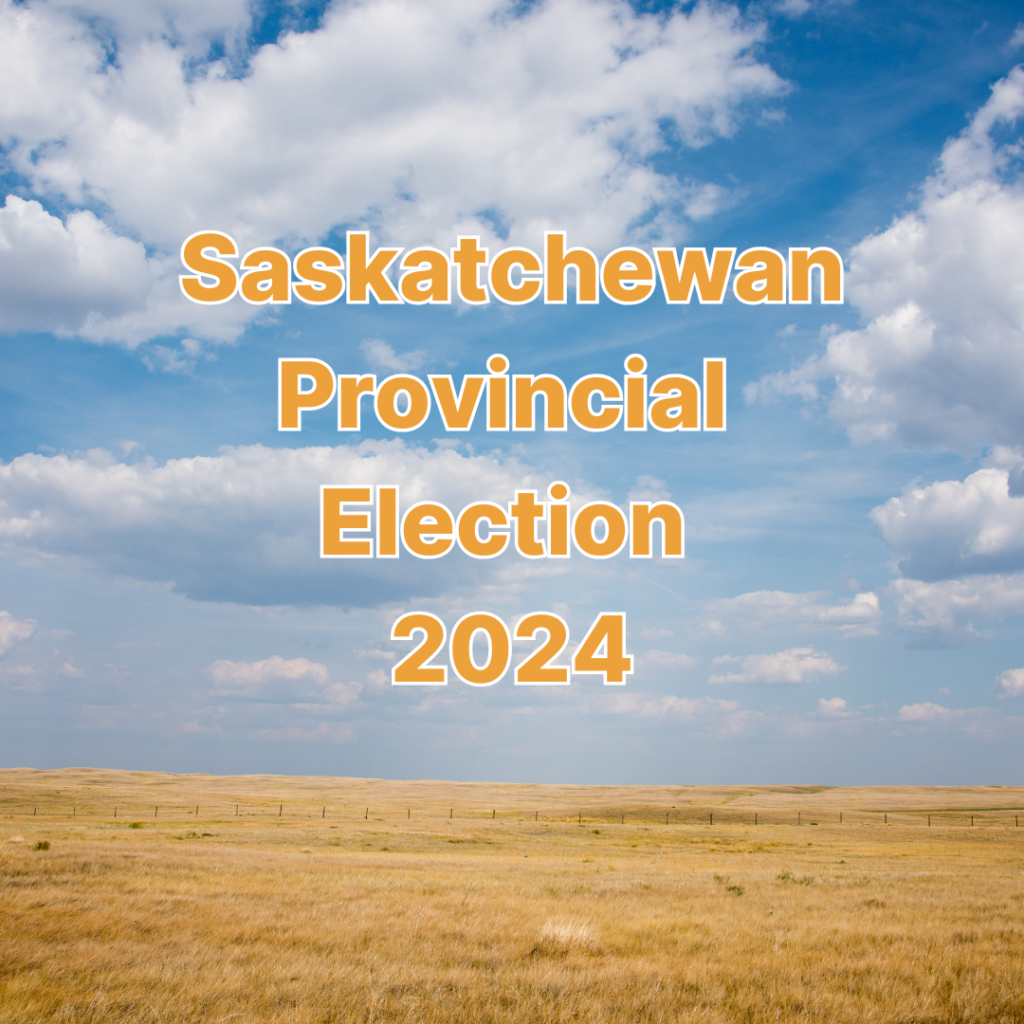In a recent CPAWS-SK survey, we engaged with over 1,000 Saskatchewan residents to ask them questions about preserving natural habitats in Saskatchewan. Ninety percent of survey respondents agreed or strongly agreed that protecting wildlife, conserving grasslands and key wetlands, and ensuring a thriving and biodiverse prairie landscape for future generations should be a top priority.
We engaged with the political parties running in this 2024 Saskatchewan provincial election and posed the same three questions regarding where they stand on environmental and nature conservation issues. Here are the responses given by a representative from each party to help you make an informed decision as you vote this week.
All responses were received in writing from a representative of each party, are listed verbatim, and have not been edited in any way.
- With less than 15% of native grasslands remaining in Saskatchewan – an ecosystem, including wetlands, that provides significant value to agriculture, communities, biodiversity and climate mitigation – what immediate actions will your government take to halt and reverse the continued degradation, loss and fragmentation of one of the most endangered biomes in the world?
Saskatchewan NDP:
Grasslands play an essential role in Saskatchewan and should be preserved for generations to come. However, Scott Moe has made it clear in his words and his actions that he does not care about the environment, even as grasslands are acknowledged as one of the world’s most endangered ecosystems.
The Saskatchewan NDP election platform includes a commitment to create a new $5 million program to work with conservation groups to invest in protecting biodiversity, wetlands and native prairie grasslands. We are also committed to developing a carbon offset program that recognizes the important role ranchers play in protecting grasslands and wetlands.
Saskatchewan Party:
The Saskatchewan Party government is establishing a network of ecologically important land and water areas across the province. Protected and conserved areas are pieces of the landscape set aside to preserve natural and cultural features.
Approximately 6.4 million hectares, or 9.8 percent of the landscape are included in the program with the objective to:
- Preserve ecological resources;
- Maintain the integrity of biologically diverse areas;
- Protect habitat for wildlife;
- Preserve areas of high scenic value and unique physical features, such as waterfalls, badlands and sand dunes; and
- Provide recreational, educational and research opportunities.
Additionally, the Water Security Agency is developing an Agriculture Water Stewardship Policy. The Stewardship Policy will contain wetlands component. A broad interest-based engagement began in July 2022 and focused on engaging with agricultural stakeholder groups, environmental groups, municipal and community organizations, First Nations and Métis organizations and communities, and key research organizations.
A re-elected Saskatchewan Party will ensure this important work continues.
Saskatchewan Buffalo Party:
As a farmer, I have noticed how much of a longer growing season we now have and The Western Producer article below notes how the growing season is now 15-20 days longer than it used to be on the Prairies. We have benefited from this longer growing season immensely.
Growing season grows longer | The Western Producer
Unfortunately, since 2006 when changes were made to allow large scale out of province ownership of farmland, Saskatchewan has lost a massive number of family-owned farms. There are now many land-owning corporations 100,000 acres in size and larger. The business model for these massive entities is to bulldoze every tree and drain every wetland possible. The environmental consequences of this activity on such a large scale are very detrimental. The Buffalo Party has a plan to address this as you will see in our attached policy on agriculture.
Agriculture.pdf (nationbuilder.com)
There is also new hope for agriculture through regenerative agriculture. Livestock provide immense benefits through their lifecycle to replenish the soil with carbon and other nutrients. An example of this is rotational grazing that has the potential to triple the amount of plant growth per acre by 3X. This increased plant growth rejuvenates the soil by adding much needed carbon to the soil.
Saskatchewan Green Party:
- We need and will put in place legislated protections for our grasslands and wetlands in Saskatchewan. The Saskatchewan Greens will enact legislation to protect these valuable carbon sinks.
- We will identify, monitor and act on recommendations to conserve these habitats.
- In line with the recommendation from the IPCC, Intergovernmental Panel on Climate Change, reach peak emissions by 2025 and reduce to 60% of 2019 levels by 2034.
- We will put in legislation to respect the role of vegetation, landforms and aquatic systems in our air quality and reflect their value within cost-benefits assessments and regulations.
- We will put in place frame works to incentivize permaculture farming practices, restoring lost grassland within agricultural areas. (This has worked well on our leader, Naomi Hunter’s farm, pollinators and wildlife returned to the land within five years).
The Saskatchewan Progress Party, Saskatchewan Progressive Conservative Party and Saskatchewan United Party have not provided a response.
- Indigenous-led conservation plays a critical role in protecting and conserving ecological and culturally rich landscapes. How will your government support and prioritize Indigenous-led conservation initiatives?
Saskatchewan NDP:
First Nations and Métis people have extensive expertise and traditional knowledge related to the preservation of the natural landscape. Unfortunately, the Sask party has historically shown no more interest in consulting them than any other conservation experts.
Saskatchewan New Democrats are serious about creating meaningful partnerships with First Nations and Métis communities in our province. That’s why we are enshrining Duty to Consult into law. We look forward to collaborating with Indigenous partners on conservation initiatives.
Saskatchewan Party:
The Saskatchewan Party government is committed to reconciliation and the duty to consult. A re-elected Saskatchewan Party government will continue to consult First Nations and Métis people on economic development and conservation initiatives.
Saskatchewan Buffalo Party:
One of the most rewarding compliments I have received on the campaign trail is from my First Nations friends regarding our Buffalo Party name and logo. I believe we are at a tipping point where Saskatchewan residents are deeply distrusting our food supply. As the Buffalo Party works to restore proper ownership and stewardship of Saskatchewan farmland, I believe First Nations agriculture will prosper. More and more Saskatchewan residents are seeking healthy food choices and the respect that First Nations have always demonstrated to the land and the animals on it are an example for all of us.
Saskatchewan Green Party:
We will:
- Respect Indigenous Peoples and address environmental harms.
- The Saskatchewan Greens have adopted a resolution respecting the Rights of Mother Earth and rewritten our entire policy document to reflect this and with the help and guidance of Elders.
- Support energy sovereignty for Indigenous communities by increasing opportunities for First Nations and Métis involvement in renewable energy projects.
- Recognize that climate change and environmental degradation have disproportionately affected Indigenous peoples in Saskatchewan.
- Ensure Indigenous people are included and influence government decision making by affirming the sovereignty of Indigenous Nations, the government’s duty to uphold treaty obligations, and the importance of traditional land practices.
- Require the full consent of impacted Indigenous communities in development and natural resource projects, to revenue-sharing and co-management with these communities.
- Partner with Indigenous Communities to preserve and protect watersheds, natural environments, and prime agricultural lands.
- Prioritize remediation of contaminated water sources, especially in Indigenous communities, which are disproportionately affected.
The Saskatchewan Progress Party, Saskatchewan Progressive Conservative Party and Saskatchewan United Party have not provided a response.
- The dual crises of biodiversity loss and climate change is requiring all levels of governments to limit and prevent further biodiversity loss and adapt to a changing climate. With specific reference to major infrastructure proposals that pose a significant threat to at-risk flora and fauna in Saskatchewan, what will your government’s stance be on the Lake Diefenbaker Irrigation Project and Saskatoon Freeway Project?
Saskatchewan NDP:
It is vital for a government to earn and maintain public trust when it comes to projects with the potential for major impacts on the economy and the environment. The Sask. Party government has a responsibility to the residents and agricultural producers of Saskatchewan to do their due diligence on major projects, but they are so tired and out of touch they think they are entitled to skip it. It’s unacceptable that they would hide feasibility studies from the people of this province. Our view is that major project should not go forward without thorough assessment of their impacts on the environment, on water supplies, and on the rights of First Nations and Métis people.
Saskatchewan Party:
A re-elected Saskatchewan Party government will continue to advance the Westside Irrigation Rehabilitation Project. Analysis by KPMG LLP shows this project will result in and increase in Gross Domestic Product of $5.9 billion while generating over 30,000 jobs and 9,500 jobs during the construction phase. A conservative estimate of tax revenues to governments is projected to be upwards of $770 million with value added processing. The overall GDP impact will increase significantly when factoring in the potential value-added benefits over a 50-year period. As seen in other jurisdictions, there is a direct connection to expanding irrigated acres and value-added processing investments.
A re-elected Saskatchewan party government will continue to advance the planning and study of the Saskatchewan Freeway project. Investments in highways benefit Saskatchewan’s economy and communities while improving safety for Saskatchewan families. Since 2007, the Saskatchewan Party government has improved over 20,700 kms of highway across Saskatchewan. A re-elected Saskatchewan Party government will deliver on its Growth Plan commitment to improve 10,000 kms of highways by 2030.
Saskatchewan Buffalo Party:
The controversies surrounding the Saskatoon Freeway Project are many. The Buffalo Party will work with the City of Saskatoon and its residents on the future of this project. New leadership at the provincial and municipal level will give a fresh perspective.
In conjunction with our policies on Agriculture, we have deep concerns about the proposed expansion of irrigation at Lake Diefenbaker. Who are the landowners that would profit from this and what about the extensive concerns from communities that would be affected by this expansion? Given these concerns, the Buffalo Party is not in favour of the proposed expansion.
Saskatchewan Green Party:
With the climate crisis impacting our water supply in Saskatchewan, committing $4 billion to a mega-irrigation project that will only benefit a few already wealthy farmers, is something the Saskatchewan Green Party is completely opposed to.
We also are not in favour of the Saskatoon Freeway Project. It would pass through two sensitive natural wetlands. This project would cause irreversible harm to the northeast and Small Swales. This project should have a thorough environmental assessment done on it and it should be cancelled.
The SGP also opposes the SaskParty and NDP (they agreed to nuclear) proposed fleet of GE-Hitachi BWRX-300 Small Modular Nuclear Reactors. Nuclear requires massive amounts of water for cooling to prevent meltdowns. It is planned that Lake Diefenbaker and/or the Rafferty Reservoir would have to absorb the heat. This would have a negative impact on flora and fauna in the area. Lake Diefenbaker supplies drinking water for 70% of Saskatchewan’s population, radioactive contamination would have a devastating effect on our already drought-prone province.
We favour a Smart Grid, with more renewables and interprovincial sharing to quickly reduce our irresponsibly high emissions. Right now SK has only 75 MW capacity of solar, yet the most sunlit days in Canada. We had an excellent solar net metering rebate in SK that was cancelled by the SaskParty. Saskatchewan needs wind, solar and geothermal.
The Saskatchewan Progress Party, Saskatchewan Progressive Conservative Party and Saskatchewan United Party have not provided a response.

